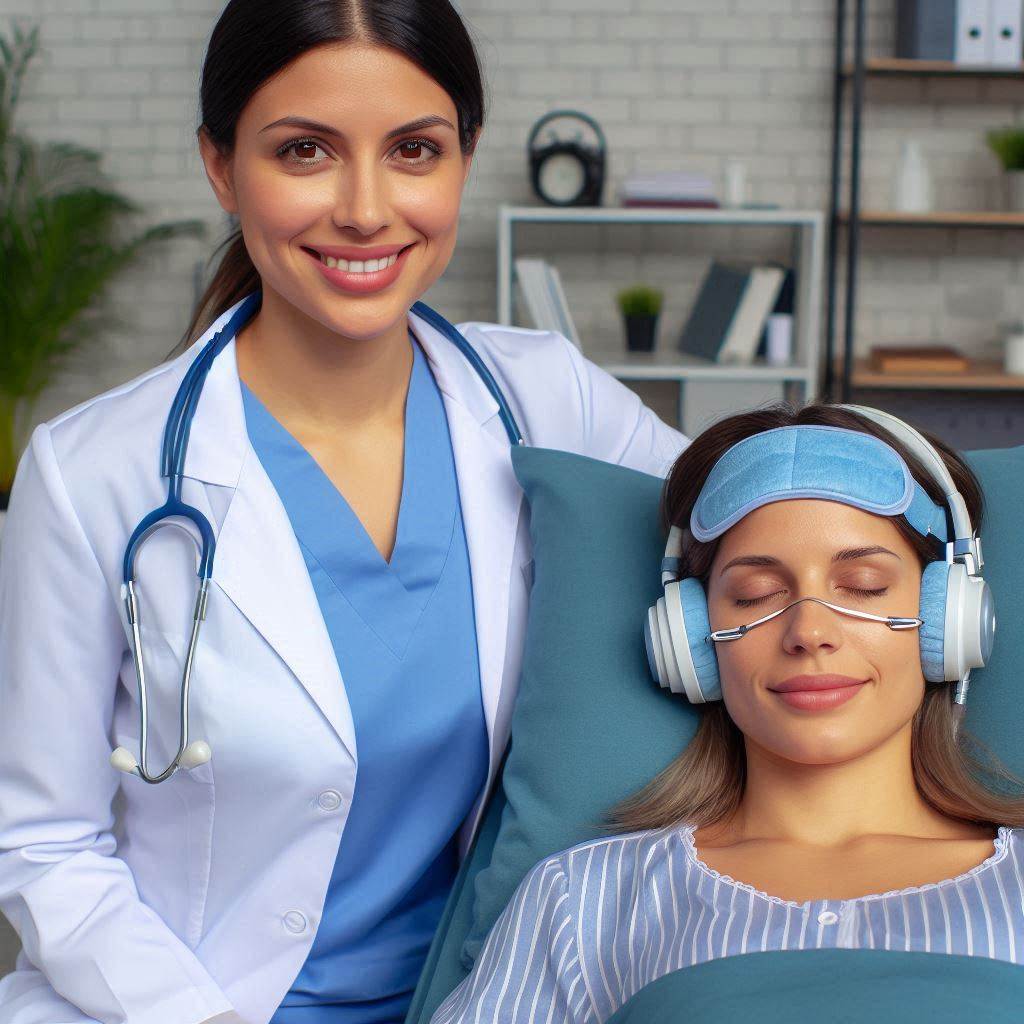Introduction
A sleep technologist plays a vital role in diagnosing sleep disorders.
This blog post aims to shed light on the responsibilities and tasks of a sleep technologist.
Responsibilities of a Sleep Technologist
A sleep technologist is responsible for conducting sleep studies to monitor patients while they sleep.
They set up and calibrate sleep equipment to ensure accurate data collection during the study.
Monitoring the patients throughout the night and observing their sleep patterns is also part of their job.
After the sleep study, they analyze the data collected to identify any abnormalities or sleep disorders.
They collaborate with physicians to establish a treatment plan based on the sleep study results.
Importance of Sleep Technologists
Sleep technologists play a crucial role in the diagnosis of various sleep disorders such as sleep apnea.
By accurately monitoring and analyzing sleep patterns, they help in identifying underlying issues affecting sleep quality.
This, in turn, allows for appropriate medical interventions and treatments to improve the patient’s quality of sleep.
In general, sleep technologists are essential in diagnosing and treating sleep disorders.
Their expertise and dedication contribute significantly to improving the overall quality of sleep for their patients.
By shedding light on the work of sleep technologists, this blog post highlights the crucial role they play in the field of sleep medicine.
What is a Sleep Technologist?
A sleep technologist is a healthcare professional trained to perform diagnostic tests on patients with sleep disorders.
They work in sleep centers, clinics, or hospitals to conduct tests like polysomnograms and maintain equipment to monitor patients’ sleep patterns.
Definition and Role of a Sleep Technologist
- A sleep technologist is responsible for setting up and calibrating sleep study equipment.
- They monitor patients during sleep studies and make adjustments as needed.
- Sleep technologists collaborate with sleep physicians to analyze test results.
- They educate patients on sleep disorders and treatment options.
- Documentation of test results and patient progress is also a part of their role.
Training and Certification Required
- To become a sleep technologist, one typically needs a high school diploma or equivalent.
- Most employers require completion of a formal sleep technology training program.
- Certification through organizations like the Board of Registered Polysomnographic Technologists is often required.
- Continuing education is necessary to maintain certification and stay up-to-date on advancements in the field.
Skills and Qualities Needed
- Attention to detail is crucial for accurately monitoring and analyzing sleep patterns.
- Strong communication skills are essential for explaining procedures to patients and collaborating with other healthcare professionals.
- Technical proficiency is needed to operate and troubleshoot sleep study equipment.
- Empathy and patience are important qualities when working with patients who may be struggling with sleep issues.
- Organization and time management skills are necessary to juggle multiple patients and tasks.
Responsibilities of a Sleep Technologist
As a sleep technologist, there are several key responsibilities that are integral to the role.
These responsibilities play a crucial role in diagnosing and treating patients with sleep disorders.
Conducting Sleep Studies
One of the primary responsibilities of a sleep technologist is to conduct sleep studies on patients.
These studies help in diagnosing various sleep disorders such as sleep apnea, insomnia, and narcolepsy.
During a sleep study, the technologist attaches sensors to the patient to monitor their brain waves, breathing patterns, heart rate, and other vital signs while they sleep.
This data is then used to identify any abnormalities or disturbances in the patient’s sleep.
Setting Up and Monitoring Equipment
Another essential task for a sleep technologist is setting up and monitoring the equipment used during sleep studies.
This equipment includes devices such as polysomnography machines, which record the patient’s physiological responses during sleep.
The technologist must ensure that all equipment is functioning properly and accurately capturing the data needed for analysis.
They also monitor the patient throughout the night to make any necessary adjustments to the equipment or sensors.
Analyzing Results and Preparing Reports
Once the sleep study is completed, the sleep technologist is responsible for analyzing the results and preparing detailed reports for physicians.
These reports contain information about the patient’s sleep patterns, any abnormalities detected, and recommendations for treatment.
By carefully analyzing the data collected during the sleep study, the technologist can provide valuable insights to the physician.
Helping them make an accurate diagnosis and develop an effective treatment plan for the patient.
Transform Your Career Today
Unlock a personalized career strategy that drives real results. Get tailored advice and a roadmap designed just for you.
Start NowEssentially, the role of a sleep technologist is multifaceted and crucial in the diagnosis and treatment of sleep disorders.
By conducting sleep studies, setting up and monitoring equipment, technologists play a vital role in improving the quality of life for patients with sleep disorders.
Types of Sleep Disorders Diagnosed
Common Sleep Disorders a Sleep Technologist May Encounter
Sleep technologists play a crucial role in diagnosing and treating various sleep disorders.
Among the most common disorders they encounter are sleep apnea, insomnia, narcolepsy, and restless legs syndrome.
These conditions disrupt normal sleep patterns and can significantly impact a person’s health and well-being.
Symptoms and Signs of Sleep Disorders
Recognizing the symptoms and signs of sleep disorders is essential for sleep technologists.
Sleep apnea, for example, is characterized by loud snoring, pauses in breathing during sleep, and excessive daytime sleepiness.
Insomnia manifests as difficulty falling or staying asleep, leading to daytime fatigue and irritability.
Narcolepsy involves sudden and uncontrollable episodes of falling asleep during the day, often accompanied by hallucinations and sleep paralysis.
Restless legs syndrome causes uncomfortable sensations in the legs, especially at night, prompting movement to relieve discomfort.
Importance of Early Detection and Diagnosis in Improving Patients’ Quality of Life
Early detection and diagnosis of sleep disorders can profoundly improve patients’ quality of life.
Untreated sleep apnea, for instance, increases the risk of heart disease, stroke, and other serious health conditions.
Prompt diagnosis allows sleep technologists to recommend effective treatments such as continuous positive airway pressure (CPAP) therapy.
Which helps maintain open airways during sleep.
Similarly, early diagnosis of narcolepsy and restless legs syndrome allows for tailored treatments that alleviate symptoms and enhance daily functioning.
Sleep technologists also educate patients about sleep hygiene practices, promoting habits that support restful sleep.
These include maintaining a consistent sleep schedule, creating a comfortable sleep environment, and avoiding stimulants like caffeine before bedtime.
Generally, sleep technologists play a vital role in identifying and managing sleep disorders that affect many individuals’ daily lives.
By recognizing symptoms early and providing accurate diagnoses, they contribute significantly to improving patients’ overall health and well-being.
Early intervention not only alleviates symptoms but also reduces the risk of complications associated with untreated sleep disorders.
Understanding the variety of sleep disorders and their symptoms equips sleep technologists to offer personalized care and support to their patients.
Through ongoing education and advancements in sleep medicine.
These professionals continue to enhance their ability to diagnose and treat sleep disorders effectively.
Ultimately, the work of sleep technologists is integral to helping individuals achieve better sleep and improved quality of life.
Their efforts in early detection and treatment make a substantial difference in managing sleep disorders and promoting overall health and wellness.
Read: Work Environment for Surgical Technologists: Hospitals vs. Clinics
Tools and Equipment Used by Sleep Technologists
When it comes to conducting sleep studies and diagnosing sleep disorders, sleep technologists rely on a variety of tools and equipment.
These tools are essential for monitoring various physiological parameters during sleep, helping to identify and understand the root causes of sleep-related issues.
Overview of the Equipment Used During Sleep Studies:
- Polysomnography Machine: This machine is the cornerstone of sleep studies and is used to record multiple physiological parameters such as brain waves, eye movements, muscle activity, and heart rhythm during sleep.
- Electroencephalogram (EEG): An EEG is used to monitor brain activity by recording electrical impulses in the brain. It helps in identifying different sleep stages and abnormalities in brain function during sleep.
- Electromyogram (EMG): EMG measures muscle activity and helps in identifying muscle tone and movements during sleep. It is crucial for detecting conditions like sleep apnea and periodic limb movement disorder.
- Electrooculogram (EOG): EOG is used to monitor eye movements during sleep. It helps in determining rapid eye movement (REM) sleep and diagnosing sleep disorders like REM sleep behavior disorder.
How Each Tool Helps in Diagnosing Sleep Disorders:
Each of the tools mentioned above plays a specific role in diagnosing various sleep disorders and providing valuable insights into a patient’s sleep patterns and behaviors.
- Polysomnography Machine: This machine is crucial for diagnosing sleep apnea, narcolepsy, insomnia, and other sleep disorders by recording vital physiological data throughout the night.
- Electroencephalogram (EEG): An EEG helps in differentiating sleep stages, detecting abnormal brain activity, and diagnosing conditions like seizures and parasomnias.
- Electromyogram (EMG): EMG is essential for identifying muscle-related sleep disorders like periodic limb movement disorder and REM sleep behavior disorder.
- Electrooculogram (EOG): EOG assists in diagnosing REM sleep behavior disorder, sleep-related movement disorders, and other conditions characterized by abnormal eye movements during sleep.
Importance of Proper Calibration and Maintenance of Equipment
Ensuring that all sleep study equipment is properly calibrated and maintained is essential for obtaining accurate and reliable data.
Proper calibration and maintenance guarantee that the tools function optimally and provide precise measurements throughout the study.
- Calibration: Regular calibration of equipment such as the polysomnography machine ensures that the recorded data is accurate and reflects the patient’s actual physiological state during sleep.
- Maintenance: Routine maintenance of tools like the EEG, EMG, and EOG is vital for preventing malfunctions and ensuring consistent performance during sleep studies.
- Quality Assurance: Sleep technologists conduct quality assurance checks on the equipment to verify that it meets established standards and delivers reliable results for diagnosing sleep disorders.
- Training and Certification: Technologists undergo training to operate and maintain sleep study equipment effectively, ensuring that they can accurately interpret the data collected during sleep studies.
In fact, the tools and equipment used by sleep technologists are critical for diagnosing sleep disorders and providing personalized treatment plans for patients.
Proper calibration and maintenance of equipment are essential to ensure accurate data collection and reliable diagnostic outcomes.
Read: The Role of Technology in Modern Sonography

Collaborating with Medical Professionals
Working Closely with Sleep Medicine Physicians to Interpret Results
Sleep technologists play a critical role in the sleep study process. They work closely with sleep medicine physicians to interpret results.
After conducting sleep studies, technologists analyze data to identify sleep patterns and abnormalities.
They then collaborate with physicians to ensure accurate diagnosis.
This partnership is crucial in understanding complex sleep issues and providing effective treatment plans.
Treatment Options for Patients with Diagnosed Sleep Disorders
Once a diagnosis is made, sleep technologists discuss treatment options with patients.
They explain the diagnosis, outlining the various treatment strategies available.
For sleep apnea, they might suggest continuous positive airway pressure (CPAP) therapy, which maintains open airways during sleep.
For insomnia, they could recommend cognitive-behavioral therapy or medication. For restless legs syndrome, lifestyle changes and medications may be discussed.
Sleep technologists ensure patients understand their treatment options, helping them make informed decisions.
They provide detailed explanations and answer any questions, ensuring patients feel comfortable and supported in their treatment journey.
Importance of Effective Communication and Teamwork in Providing Comprehensive Care for Patients
Effective communication and teamwork are essential in providing comprehensive care for patients with sleep disorders.
Sleep technologists, physicians, and other healthcare professionals must work together seamlessly.
Clear communication ensures that all team members are informed about a patient’s condition and treatment plan.
Teamwork is crucial when developing and adjusting treatment plans.
Sleep technologists must communicate patient progress and any issues to physicians promptly.
This collaboration allows for timely adjustments to treatment, enhancing patient outcomes.
Regular team meetings and case discussions foster a collaborative environment, ensuring everyone is on the same page.
Sleep technologists also play a vital role in educating patients about their conditions and treatments.
Effective communication with patients helps them understand their sleep disorders and the importance of following treatment plans.
Technologists provide instructions on using devices like CPAP machines, ensuring patients can use them correctly at home.
Most Importantly, sleep technologists are integral to the diagnosis and treatment of sleep disorders.
They work closely with sleep medicine physicians to interpret sleep study results, ensuring accurate diagnoses.
By discussing treatment options with patients, they provide essential support and guidance, helping patients make informed decisions about their care.
Effective communication and teamwork are vital in providing comprehensive care for patients with sleep disorders.
Sleep technologists must collaborate with physicians and other healthcare professionals to develop and adjust treatment plans.
Their role in patient education further enhances the effectiveness of treatment, promoting better patient outcomes.
Ultimately, the dedication and expertise of sleep technologists contribute significantly to improving patients’ quality of life.
Their collaborative efforts with the healthcare team ensure that patients receive the best possible care, leading to better sleep and overall health.
Transform Your Career Today
Unlock a personalized career strategy that drives real results. Get tailored advice and a roadmap designed just for you.
Start NowRead: Benefits of a Career as an Ultrasound Technician
Delve into the Subject: How to Start a Career in Rehabilitation Counseling
Uncover the Details: Interview Tips for Aspiring Rehabilitation Counselors
Career Opportunities and Growth in the Field
Demand for Sleep Technologists in the Healthcare Industry
The demand for sleep technologists in the healthcare industry is increasing. Sleep disorders are becoming more recognized, driving the need for specialized care.
Sleep technologists play a crucial role in diagnosing and treating these disorders.
Advancements in sleep medicine have highlighted the importance of quality sleep.
Sleep technologists help monitor, diagnose, and manage sleep disorders. Their expertise is essential for improving patient outcomes.
Hospitals, sleep centers, and clinics require skilled sleep technologists. This demand ensures a steady growth of opportunities in various healthcare settings.
As awareness of sleep disorders grows, so does the need for qualified professionals.
Potential for Career Advancement Through Further Education and Certifications
Sleep technologists have numerous opportunities for career advancement. Further education and certifications can enhance their skills and expertise.
Advanced training opens doors to specialized roles and leadership positions.
Earning a certification from the Board of Registered Polysomnographic Technologists (BRPT) is valuable.
This credential signifies a high level of competence and dedication to the field. It can lead to higher-paying positions and greater job security.
Continuing education is crucial for staying current with advancements in sleep medicine.
Attending workshops, conferences, and online courses keeps skills updated. This commitment to learning benefits both the technologist and their patients.
Sleep technologists can pursue advanced degrees in related fields.
Degrees in respiratory therapy, neurodiagnostics, or healthcare administration broaden career options.
These qualifications can lead to roles in management, research, or education.
Salary Range and Job Outlook for Sleep Technologists in Different Settings
The salary range for sleep technologists varies by location, experience, and setting.
Entry-level positions typically start around $40,000 to $50,000 per year.
With experience and certifications, salaries can exceed $70,000 annually.
Sleep technologists working in hospitals often earn higher salaries.
These positions may involve more complex cases and require additional skills.
Sleep centers and private clinics offer competitive salaries, with benefits and bonuses.
Geographic location also impacts salary levels.
Urban areas with a higher cost of living tend to offer higher wages.
Conversely, rural areas may provide lower salaries but offer other benefits, such as lower living costs.
The job outlook for sleep technologists is positive.
The growing awareness of sleep health and disorders drives demand.
The Bureau of Labor Statistics projects continued growth in this field, ensuring job stability.
Technological advancements in sleep medicine create new opportunities.
Innovations in sleep monitoring and treatment require skilled technologists.
Staying updated with these advancements enhances job prospects and career longevity.
The demand for sleep technologists in the healthcare industry is rising.
As sleep disorders gain recognition, the need for skilled professionals increases.
Career advancement through further education and certifications offers numerous opportunities.
The salary range for sleep technologists varies but remains competitive across settings.
With a positive job outlook and advancements in sleep medicine, sleep technologists can expect a rewarding and stable career.
Read: Ultrasound Technician vs. Radiologic Technologist
Conclusion
As a sleep technologist, your main responsibility is to monitor and analyze patients while they sleep.
This involves setting up and calibrating polysomnographic equipment to record data during sleep studies.
During the sleep study, you will observe the patient’s breathing patterns, brain waves, eye movements, and more.
After the study, you will analyze the data to identify any sleep disorders or abnormalities.
It is crucial to accurately document and report your findings to the physician for further diagnosis and treatment.
As a sleep technologist, you will also be responsible for educating patients on sleep hygiene and the importance of good sleep habits.
Additionally, you may need to troubleshoot equipment issues and ensure the patient’s comfort throughout the study.
In closing, a sleep technologist plays a vital role in improving the overall health and well-being of patients.
Transform Your Career Today
Unlock a personalized career strategy that drives real results. Get tailored advice and a roadmap designed just for you.
Start NowBy accurately monitoring and analyzing sleep patterns, sleep technologists help identify and treat sleep disorders.
If you are interested in pursuing a career as a sleep technologist, know that you will be making a positive impact on people’s lives.




